Instrument Development
Timeline
- March 2021: MAG instrument passes Preliminary Design Review
- May 2021: IMAP passes Mission Preliminary Design Review
- June 2022: MAG instrument passes Critical Design Review
- October 2022: MAG-EM EMC testing
- November 2022: MAG-EM Thermal Vacuum testing
- January 2023: IMAP passes Mission Critical Design Review
- September 2023: Mission passes Systems Integration Review
- September 2023: MAG instrument passes Pre-Environmental Testing Review
- October 2023: MAG FM (flight model) starts environmental and acceptance tests ahead of delivery
Planning dates:
- January 2024: MAG Instrument Flight Acceptance Review
- February 2024: MAG electronics box installation onto the spacecraft
- April 2023: MAG sensors installation onto the spacecraft
- February 2025: IMAP launch
All the hardware of the IMAP magnetometer is being developed at Imperial College London.
The instrument is a conventional dual fluxgate instrument, based on the successful Solar Orbiter and JUICE magnetometer designs. It has required a number of technology developments for this mission:
Serial Data communications: the communications interface to the spacecraft is via a UART link, which has required an update to the Solar Orbiter hardware which uses a Spacewire link
Power interface: the power converter unit has been upgraded to interface with a less well regulated power bus: the input from the spacecraft is 24-35V, wider than the power input for Solar Orbiter
Instrument Heritage
Magnetometers built in our labs at Imperial College London have successfully operated throughout the Solar System: on Cassini in orbit around Saturn; on Ulysses over the poles of the Sun; on Double Star in Earth orbit.
Imperial College hardware is in successful operation on the four Cluster spacecraft in Earth orbit (launch 2000), the Solar Orbiter spacecraft (launched 2020) and the JUICE spacecraft (launched April 2023).
We have also provided flight hardware for the Rosetta, Venus Express and Bepi Colombo spacecraft - see the magnetometer laboratory web pages for more information.



